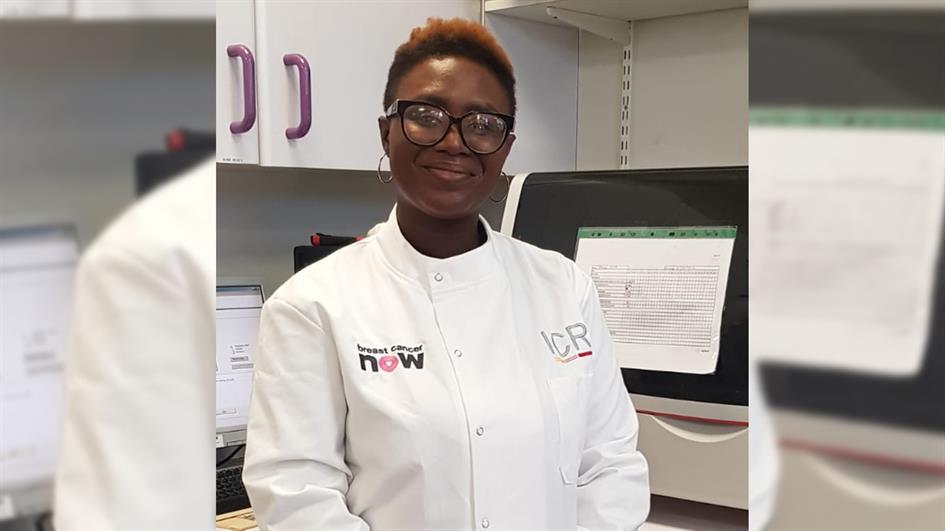
Image: Naa-Anyima Boateng
The Black Lives Matter movement has been at the forefront of many people’s minds this year.
The early weeks following the death of George Floyd at the hands of the police in America were traumatic. The mere fact that such an injustice was caught on camera for all to witness was a life-changing moment for a lot of people who viewed the video.
As disturbing and emotionally draining as George Floyd’s death was, it also spurred a global call to action, with protests across the world, and businesses, organisations and communities prioritising discussion about race.
Our Black, Asian and minority ethnic forum came together to organise. We put out a public statement which the ICR shared across social media, and followed with its own statement of support.
The protests definitely brought many of the issues we have been talking about for a long time to the fore. We met with our Chief Executive, Professor Paul Workman, and had a series of honest and in-depth conversations about how structural, systemic racial inequality affects us all – and to share our thoughts as a forum on how we can start to address some of these issues.
Professor Workman followed up on these conversations with a series of commitments for how the ICR planned to address racial inequality.
It was a fast-paced and action-oriented couple of weeks – both exhausting and exciting for all of us involved. Now the real work begins as we continue to engage across our organisation and start to develop projects and deliver action.
A career in research as a Black scientist
I think my time working in science has been smoother than most. Nevertheless, I do feel that within the scientific field there is a thick glass ceiling for people from BAME backgrounds, and even more so for those who are Black.
A pattern that is widely known and recognised within our community is that even after having studied a science degree, and obtained a job within science, many people from BAME communities eventually turn to use our skills in a different sector all together. These barriers mean we are losing talent, and we have to work together to smash this glass ceiling for all to break through.
Race Equality: Beyond the Statements
In early September, the ICR launched an action plan setting out some initial steps for how we will enact our commitments towards achieving race equality.
Our action plan, Race Equality: Beyond the Statements, seeks to address the under-representation of Black, Asian and minority ethnic staff in leadership roles and in research careers within the ICR.
It sets out the steps the ICR will take to create an environment where all can thrive, by opening up conversations about race across all aspects of working and studying here, and seeking to understand and address challenges faced by BAME staff and students.
We have made commitments across six initial areas of work:
- Increasing BAME representation in senior roles. We know that the representation of Black staff in professorship roles is a particular issue for the higher education sector
- Appointing champions for ethnic diversity across our Executive board, Faculty and Academic Dean's team
- Running a campaign of awareness to open up conversations around race
- Embracing participation in equality networks and activities
- Ensuring fair and equitable staff and student recruitment, including anonymisation of recruitment procedures where possible
- Encouraging more BAME people to enter science through our public engagement and outreach activities.
Over the summer, the ICR has been consulting staff and students through a series of focus groups, to ensure that we hear different views from across the organisation, to help us enhance and accelerate our 'Beyond the Statements' plans.
Jointly run by the ICR and the Royal Marsden NHS Foundation Trust, the Black, Asian and minority ethnic forum brings together all our staff and students to meet and help promote diversity and drive greater equality in our workplaces.
Understanding progress
Good data is a crucial starting point to monitor and understand progress, and the ICR has committed to publish a pay gap analysis by ethnicity in early 2021 to help understand and take actions to address any differences found.
It will be important to continue to assess our staff and student recruitment processes, and whether the steps we put in place help us to achieve fair and inclusive results.
The ICR also plans to analyse the ethnicity data it holds on each career path to understand and address the 'leaky pipeline' of BAME researchers and Corporate Services staff.
There is a real energy for change – and I have felt buoyed by the support for this programme of work across the organisation.
The work of the Black, Asian and minority ethnic forum at the ICR and The Royal Marsden has always been crucial in ensuring we had a safe place where we could celebrate our achievements and discuss issues we have, and we’re proud of our work as a group to make the ICR a more inclusive workplace where all staff feel welcome.
The kinds of conversations that are needed are not always easy to have. The whole point of inequality being a structural issue is that, often, it’s hard for individuals to recognise their own role in a system, or to see the cards that are stacked – the barricades that have to be dismantled and behaviours unlearned.
But we’re so pleased to be having these conversations and to see the work get the priority it deserves.